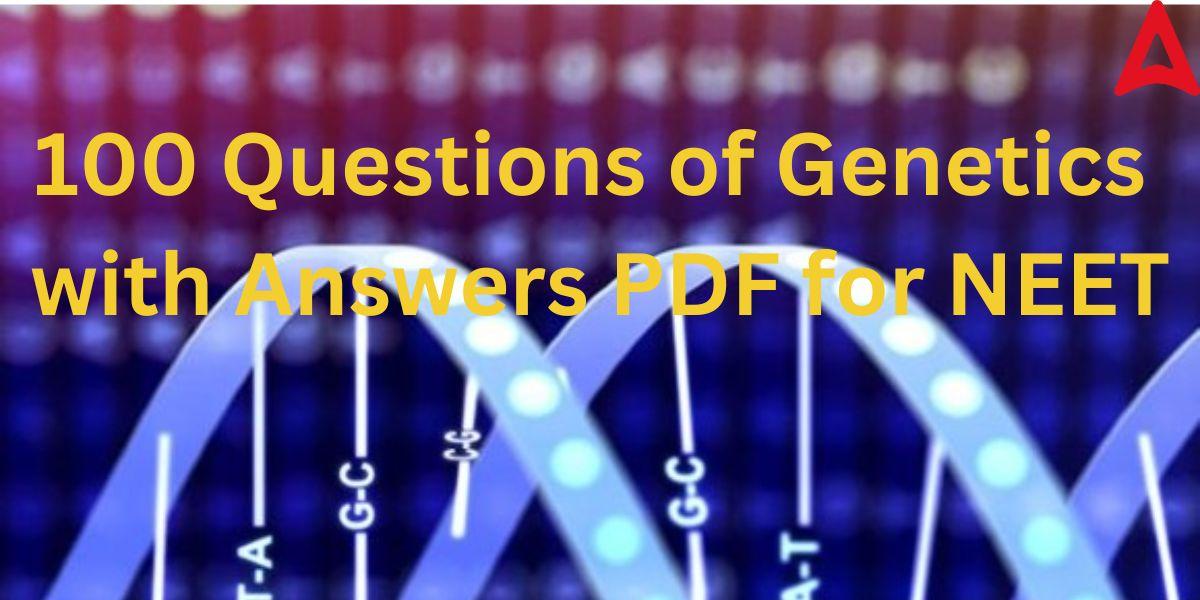Table of Contents
100 Questions of Genetics: The top 100 toughest questions of Genetics will help students cover all the important concepts of this unit. The 100 Multiple Choice Questions (MCQs) have been created by our expert faculty for NEET at Adda 247. These questions will not only cover the concepts asked in the NEET exam but will also be helpful for other competitive exams and university exams. Apart from that, a detailed video explanation of those 100 questions on genetics is also given in this article for students. After going through the video and questions and their solutions PDF, students will surely score full marks in NEET in this segment.
100 Questions of Genetics
The questions on genetics are favorite of examiners as it provides examiners with a multitude of question types, ranging from complex numerical to analytical questions. After understanding all these questions and their solutions, students can easily solve all the concepts of genetics for any competitive or board exam. The study of genes, genetic variants, and inheritance in organisms is the focus of genetics. Gregor Mendel made the discovery after researching the pea plant’s inheritance patterns. Hereditary traits and genes are investigated within the field of genetics. A geneticist is a scientist who specializes in studying genetics.
Importance of Questions of Genetics for NEET
Genetics is the most important unit in Biology section of the NEET. It has the highest weightage in the NEET exam, when it comes to the biology subject. This chapter also features the highest number of questions in NEET UG from all the sections combined. Every year, around 13-15 questions are asked from the concept of genetics in the NEET exam. So, one can understand the high importance of this topic in context of NEET examination. It accounts for around 1/7th of the question in the Biology section. So, this unit plays a make or break role in the NEET exam. By preparing this chapter, students can make sure of scoring 50-60 marks. As every mark has a great importance in NEET exam, 50-60 marks can easily help someone bag a good college and confirm their MBBS seat. Understanding the crucial role of this chapter in the NEET exam, our expert NEET faculty at Adda 247 have compiled top 100 questions and numerical of genetics that will help students prepare this topic completely. The PDF of the same is given in subsequent sections.
MCQs on Genetics with Answers
Some of the important MCQs on Genetics chapter that will be helpful for students appearing for different competitive exam is given hereunder.
Q1. The process of transfer of hereditary character from one generation to another is known as
- A. Genes
- B. Mutation
- C. Variation
- D. Genetics
Ans => D
Q2. Who is known as father of genetics?
- A. Gregor Mendel
- B. Augustinian friar
- C. Norman Borlaug
- D. M.S Swaminathan
Ans => A
Q3. Who coined the term Mutation?
- A. James Watson
- B. Herman Joseph Muller
- C. Hugo de Vries
- D. None of the above
Ans => C
Q4. The tendency of an offspring to resemble its parent is known as
- A. Heredity
- B. Variation
- C. Inheritance
- D. Resemblance
Ans => A
Q5. The genotypic ratio of a monohybrid cross is
- A. 1:2:1
- B. 3:1
- C. 2:1:1
- D. 9:3:3:1
Ans => A
Q6. The crossing of F1 to either of the parents is known as
- A. Test cross
- B. Back cross
- C. F1 cross
- D. None of the above
Ans => B
Q7. Homozygosity and heterozygosity of an individual can be determined by
- A. Back cross
- B. Self-fertilization
- C. Test cross
- D. All of the above
Ans => C
Q8. An exception to Mendel’s law is
- A. Independent assortment
- B. Linkage
- C. Dominance
- D. Purity of gametes
Ans => B
Q9. A sudden change in the gene which is heritable from one generation to other is known as?
- A. Variation
- B. Cloning
- C. Totipotency
- D. Mutation
Ans => D
Q10. Which plant Gregor Mendel had cross breed for his experiment?
- A. Onion plant
- B. Carrot plant
- C. Pea plant
- D. Lily plant
Ans => C
MCQs on Genetics For NEET
Below are some of the most important sample questions on genetics for NEET. The complete list of 100 questions of genetics along with their solutions in the PDF format is provided below. Some important NEET MCQs on genetics are hereunder. Go through the PDF and video to know about the answers to these MCQs.
Q.1) A gene is said to be dominant if :–
(1) It express it’s effect only in homozygous stage.
(2) It is expressed only in heterozygous condition
(3) It is expressed both in homozygous and heterozygous condition.
(4) It is never expressed in any condition.
Q.2) Which one of the following traits of garden pea studied by Mendel, was a recessive feature?
(1) Axial flower position
(2) Green seed colour
(3) Green pod colour
(4) Round seed shape
Q.3) A trihybrid cross is made between two plants with genotypes A/a B/b C/c how many off-springs of such cross will have a genotype a/a b/b c/c ?
(1) 1/64
(2) 1/4
(3) 1/16
(4) 1/32
Q.4) What result Mendel would have got when he self pollinated a dwarf F2 plant ?
(1) All tall plants
(2) Tall and dwarf plants in 3:1 ratio
(3) All dwarf plants
(4) Tall and dwarf plants in 1:1 ratio
Q.5) The phenotype of any character will not be affected if the modified allele produces :-
(1) Normal enzyme
(2) Non-functional enzyme
(3) No-enzyme at all
(4) 2 and 3 both
Q.6) The recessive characters are :-
(1) Only expressed in heterozygous condition
(2) Only expressed in homozygous condition
(3) Blend in heterozygous condition
(4) Always impure
Q.7) In Mirabilis & Antirrhinum plant the appearance of the pink hybrid (Rr) between cross of a red (RR) and white (rr) flower parent indicates :
(1) Incomplete dominance
(2) Segregation
(3) Dominance
(4) Heterosis
Q.8) When the phenotypic and genotypic ratios resemble in the F2 generation it is an example of
(1) Independent assortment
(2) Qualitative inheritance
(3) Segregation of factors
(4) Incomplete dominance
Q.9) AB – Blood group shows :-
(1) Co-dominance
(2) Complete dominance
(3) Mixed inheritance
(4) Composite inheritance
Q.10) ABO blood group is an example of :-
(1) Epistasis
(2) Multiple allelism
(3) Pleiotropism
(4) Complementary genes
Q.11) In multiple allele system a gamete possesses:-
(1) Two alleles
(2) Three alleles
(3) One allele
(4) Several alleles
Q.12) Which one of the following conditions of the zygotic cell would lead to the birth of a normal human female child ?
(1) One X and one Y chromosome
(2) Two X chromosomes
(3) Only one Y chromosome
(4) Only one X chromosome
Q.13) If two persons with ‘AB’ blood group marry and have sufficiently large number of children, these children could be classified as ‘A’ blood group : ‘AB’ blood group ‘B’ blood group in 1 : 2 : 1 ratio. Modern technique of protein electrophoresis reveals presence of both ‘A’ and ‘B’ type proteins in ‘AB’ blood group individuals. This is an example of :-
(1) Complete dominance
(2) Codominance
(3) Incomplete dominance
(4) Partial dominance
Q.14) The incorrect statement with regard to Haemophilia is :-
(1) A single protein involved in the clotting of blood is affected
(2) It is a sex-linked disease
(3) It is a recessive disease
(4) It is a dominant disease
Q.15) In a testcross involving F1 dihybrid flies, more parental-type offspring were produced than the recombinant-type offspring. This indicates:
(1) The two genes are located on two different chromosomes
(2) Chromosomes failed to separate during meiosis
(3) The two genes are linked and present on the same chromosome
(4) Both of the characters are controlled by more than one gene
Q.16) In Aabb x aaBb cross, the genotypic ratio of its progeny will be
(1) 9:3:3:1
(2) 1:2:1
(3) 4:1
(4) 1:1:1:1
Q.17) In a family, father has a blood group ‘A’ and mother has a blood group ‘B’. Their children show 50% probability for a blood group ‘AB’ indicating that :-
(1) Father is heterozygous
(2) Mother is heterozygous
(3) Either of parent is heterozygous
(4) Mother is homozygous
Q.18) Mendelian disorder are mainly determined by:
(1) Alternation or mutation in single gene
(2) Absence of one chromosome
(3) Excess of one of more chromosome
(4) All the above
Q.19) Study of family history about inheritance of a particular trait in several generations of a family called :-
(1) Phylogeny
(2) Ontogeny
(3) Pedigree analysis
(4) Cladistics
Q.20) If two pea plants having red (dominant) coloured flowers with unknown genotypes are crossed, 75% of the flowers are red and 25% are white. The genotypic constitution of the parents having red coloured flowers will be:
(1) Both homozygous
(2) One homozygous and other heterozygous
(3) Both heterozygous
(4) Both hemizygous
100 Questions (MCQs) of Genetics for NEET PDF
The top 100 MCQs that will cover all the concepts of genetics is given below in the PDF format along with their solutions. Solving these questions will not only help understand the chapter, but also help students in scoring full marks in the genetics section in the NEET exam. Click the PDF link below to view and download important NEET MCQs on Genetics and their solutions.
100 MCQs on Genetics for NEET PDF with Answers
100 Questions of Genetics – Video Explanation
The detailed video solution for the top 100 questions of genetics for NEET has been given below. These questions and solutions are in line with the latest NCERT syllabus. By going through this detailed solution video, students will have a clear cut understanding of all the concepts of genetics.





 NEET UG 2025: Is NEET Previous years Que...
NEET UG 2025: Is NEET Previous years Que...
 NEET Botany Syllabus 2025 Out, Check Cha...
NEET Botany Syllabus 2025 Out, Check Cha...
 NEET Cut Off: NEET 2025 Safe Score By Ca...
NEET Cut Off: NEET 2025 Safe Score By Ca...










